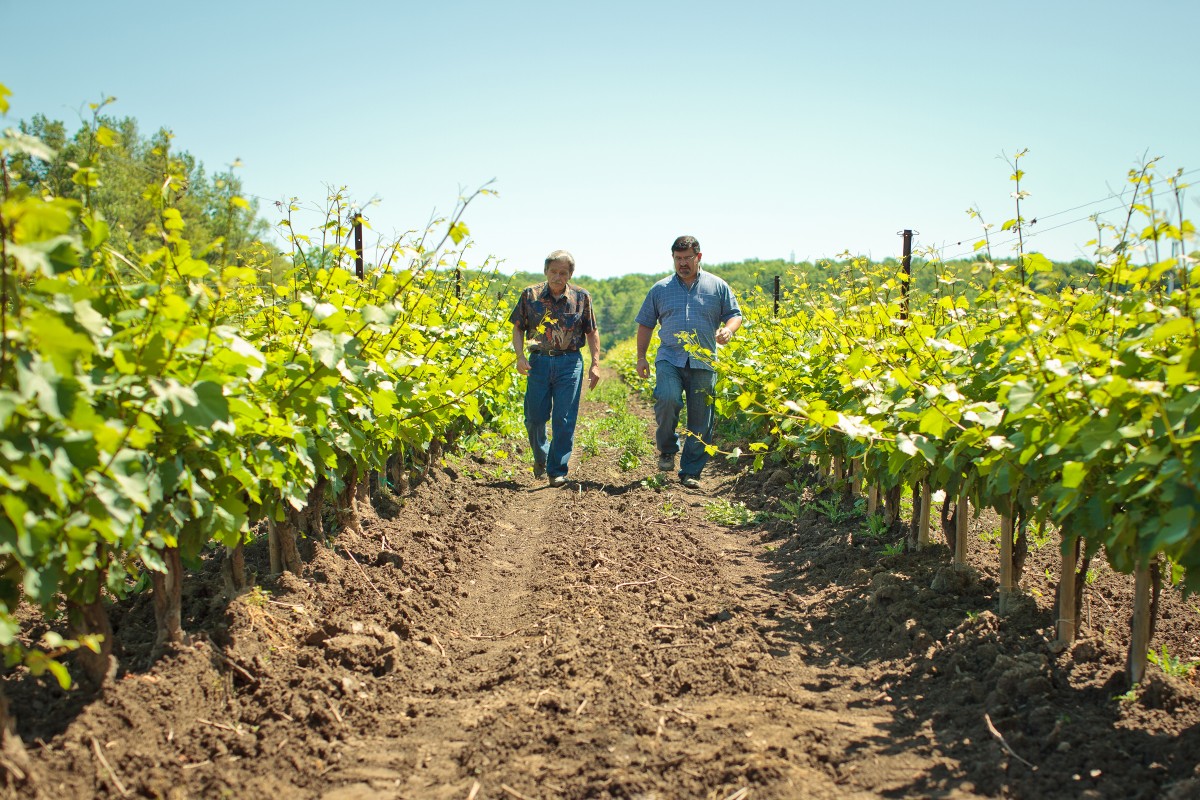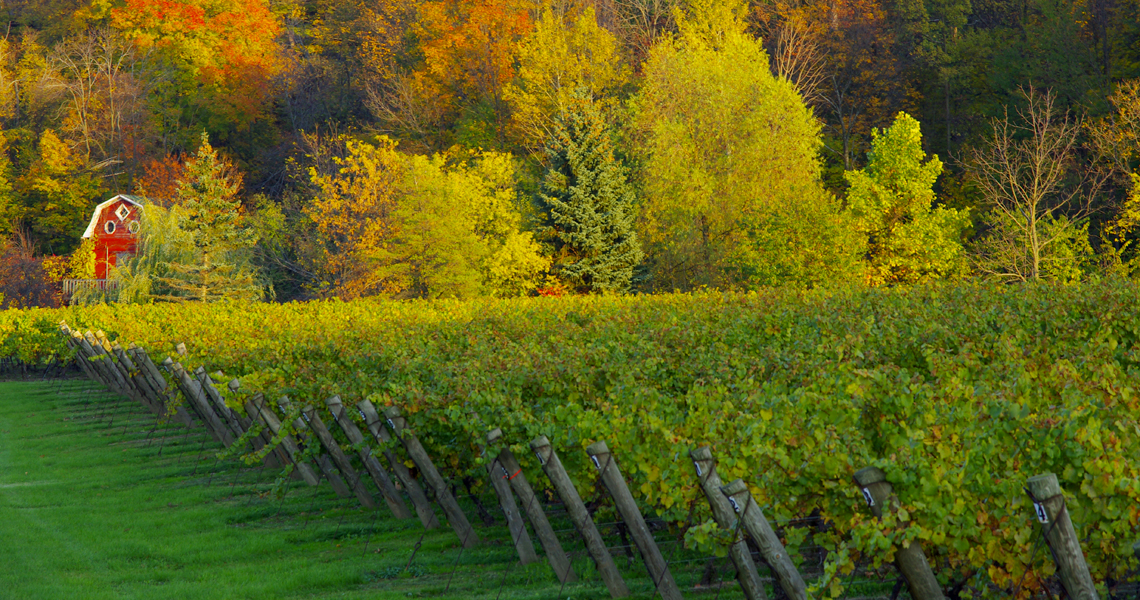
Paul Bosc Sr. is a true pioneer of the Ontario wine industry, one of the founding fathers of the modern grape and wine industry in Canada, and he was recognized for just that by the Grape Growers of Ontario.
Bosc’s Award of Merit, presented annually to recognize outstanding achievements made by an individual to the Ontario grape growing industry, leads this edition of the Ontario Wine Wire.
(In top photo, L to R: Matthias Oppenlaender, GGO Chair; Michele Bosc, Director of Marketing, Chateau des Charmes; Paul Bosc Sr.; Amelie Boury, Chateau des Charmes Winemaker; Miguel Fontalvo, Chateau des Charmes Vineyard Manager)
Award of Merit for Paul Bosc
Matthias Oppenlaender, Chair of the Grape Growers of Ontario, announced recently that this year’s award of merit recipient is Paul Bosc Sr., in well-deserved recognition of the contributions he has made over the last 50 years to the Ontario grape and wine industry. Bosc is a fitting winner as the Grape Growers of Ontario celebrate their 70th Anniversary this year.
Bosc immigrated to Canada from France in 1964 and became the Chief Winemaker and Director of Research and Development at Chateau-Gai Wines in Niagara where he began experimenting with classic European vinifera varieties.
In 1976, Paul founded Chateau des Charmes on a 60-acre plot of land on Creek Road, which became the first commercial vineyard dedicated exclusively to vinifera grape varieties. It was also the first vineyard in the Niagara area to install wind machines for cold protection.
The winery’s first vintage was produced in 1978 and the current Chateau des Charmes Estate opened its doors in 1994 as a state-of-the-art winery and visitor centre. The Bosc family now farms 280 acres in four locations all within the St David’s Bench and Four Mile Creek sub-appellations.

Bosc also believes in stewardship of the land and has been dedicated to promoting sustainable agricultural practices. As a member of the Sustainable Winemaking Ontario program, Bosc participated in the World Wine Trade Group annual conference in 2011 and, with other panellists, worked to establish an agreement on sustainability principles.
In 1988 Bosc was crowned Ontario’s Grape King, and has been the recipient of many honours since then, including a doctorate from Brock University, The Order of Ontario, The Queen’s Golden and Diamond Jubilee Medals, the inaugural Canadian Vintners Association Award of Distinction, The Order of Canada, and the LCBO Special Recognition Award.
The Grape Growers of Ontario thanked Paul for “the time and dedication he has put into the development of Ontario’s grape and wine industry, and look forward to celebrating with all our members, partners and stakeholders throughout 2017 as we celebrate our 70th Anniversary.”
Ontario’s craft wineries
adopt sustainable practices

The Wine Council of Ontario (WCO) announced recently that 13 Ontario VQA wineries are certified as part of the Sustainable Winemaking Ontario (SWO) program. Through a rigorous third-party independent audit, these wineries received passing scores, accrediting them with program certification.
“At Cave Spring Cellars our goal is to minimize our environmental impact so to preserve the natural world we live in for future generations, while recognizing the need to produce wines that are economically viable and meet the expectations of the marketplace,” said Dave Hooper, Winery Operations Manager for Cave Spring Cellars. “We take into account the impact our winemaking has on the environment and always look for ways to reduce and improve energy and water consumption. Becoming a certified Sustainable Winemaking Ontario winery was the next step to solidify our environmental practices and lay claim to our sustainable priorities in how we grow our grapes to how we make our wine,” added Hooper.
Launched in 2007 in partnership with the Grape Growers of Ontario, the SWO program was created to provide information on the environmental requirements, identify sustainable opportunities for the Ontario wine and grape industry, and acknowledge Ontario’s environmentally-friendly wineries and vineyards. New for 2017, the program has moved from a self-accredited program to a third-party independent audit, transitioning the SWO program into a certifiable program that ensures Ontario wineries adhere to environmentally sustainable practices in their winemaking operations.
In addition, eco-conscious visitors to Ontario’s wine country will now be able to discern the certified SWO wineries by the green leaf icon placed beside winery descriptions in the yearly VQA Wines of Ontario’s Wine Country Ontario Travel Guide.
“As the voice for Ontario’s VQA wine industry, it is inspiring to see a representation of craft wineries certified as Sustainable Winemaking Ontario wineries,” said Allan Schmidt, Chair of the WCO. “The commitment these wineries have made to producing wine in an environmentally-friendly manner not only ensures that their land is a better place for future generations, but it also meets the needs of the environmentally conscious consumer.”
When consumers see the green leaf logo in the Wine Country Ontario Travel Guide or purchase wine from a Sustainable Winemaking Ontario winery they are guaranteed that these wineries have followed a sustainable “from soil to shelf” path throughout the entire winemaking process.
2017 CERTIFIED SUSTAINABLE WINEMAKING ONTARIO WINERIES
- Cave Spring Cellars
- Flat Rock Cellars
- Henry of Pelham Family Estate
- Hidden Bench Vineyards & Winery
- Malivoire Wine Company
- Pelee Island Winery
- Pelee Island Winery Pavilion
- Pillitteri Estates Winery
- Reif Estate Winery
- Rosewood Estates Winery
- Southbrook Vineyards
- Stratus Vineyard
- Strewn Winery
Canadian Grapevine Certification Network

A new national not-for-profit organization called the Canadian Grapevine Certification Network, more commonly referred to as “CGCN” has been incorporated.
The CGCN is the culmination of a collaborative effort between the Grape Growers of Ontario, British Columbia Wine Grape Council, Association des vignerons du Québec and the Grape Growers Association of Nova Scotia. The objective of the CGCN is to advance the Canadian grape and wine industry by ensuring a sustainable supply of certified propagative grapevine material.
Last February, the CGCN held its first official board meeting where Hans Buchler, Research Coordinator for the British Columbia Wine Grape Council was nominated to the position of Chair and Bill Schenck, Vice Chair of the Grape Growers of Ontario was nominated to the position of Vice Chair.
The six-member Board also includes James Hopper, Director of Viticulture and Operations at VMF Estates, Matthias Oppenlaender, Chair, Grape Growers of Ontario, Fabien Gagné, Director, Association des vignerons du Québec and Robert Prange, Director, Grape Growers Association of Nova Scotia.
“The CGCN will make a long-term contribution to the continuous pursuit of excellence of the Canadian wine sector by ensuring that the best quality, disease free propagating material is available to the grape industry,” said Hans Buchler, Chair of CGCN.
The CGCN has actively engaged with CFIA, researchers and nurseries across the country in order to work toward to common goal of ensuring Canadian growers and wineries have access to clean grapevine material. One of the first orders of business for the CGCN is to establish an industry Certification Committee, who will recommend certification standards to the CGCN Board within the next year.
In addition to working toward a certification program the CGCN will also be administering the national grape and wine research cluster under the Next Policy Framework.
Canada’s grape and wine industry is a significant economic driver to the national economy which contributes $9 billion in economic impact through jobs, tourism and taxes. As CGCN continues to work toward their objective information can be found on the provincial member websites.






Comment here